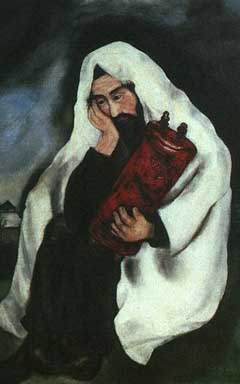 Parashat Yitro 5782, 2022: To Know Hashem Rabbi David Etengoff Dedicated to the sacred memories of my mother, Miriam Tovah bat Aharon Hakohen, father-in-law, Levi ben Yitzhak, sister, Shulamit bat Menachem, sister-in-law, Ruchama Rivka Sondra bat Yechiel, Chana bat Shmuel, Yehonatan Binyamin ben Mordechai Meir Halevi, Shoshana Elka bat Avraham, Tikvah bat Rivka Perel, Peretz ben Chaim, Chaya Sarah bat Reb Yechezkel Shraga, Shmuel Yosef ben Reuven, Shayndel bat Mordechai Yehudah, the Kedoshim of Har Nof, Pittsburgh, and Jersey City, and the refuah shlaimah of Mordechai HaLevi ben Miriam Tovah, Yocheved Dafneh bat Dinah Zehavah, and the health and safety of our brothers and sisters in Israel and around the world. Parashat Yitro is preeminently the parasha of the Asseret Hadibrot (The Ten Commandments). The first of these statements begins with the famous words, “Anochi Hashem Elokecha (I am the L-rd your G-d), Who took you out of the land of Egypt, out of the house of bondage.” (This and all Tanach translations, The Judaica Press Complete Tanach) Nearly all the monei hamitzvot (categorizers of the mitzvot) follow the opinion of the Rambam (Maimonides, 1135-204) and include this as the first of the 248 Positive Commandments. As the Rambam maintains in his Sefer HaMitzvot: The first mitzvah that we are commanded is to know the nature of G‑d’s existence, that is, to know (sh’naida) that He is the Original cause and Source of existence Who brings all creations into being. The source of this commandment is G‑d’s statement (exalted be He), “I am the L-rd your G-d.” (Translation, Rabbi Berel Bell, with my emendations) In his prologue to Mishneh Torah, Hilchot Yesodei HaTorah, the Rambam reiterates that “lei’da sh’yaish sham Elokah—to know that there is G-d,” is a mitzvah, and presents the following textual amplification: The foundation of all foundations and the pillar of wisdom is to know (lei’da) that there is a Primary Being who brought into being all existence. All the beings of the heavens, the earth, and what is between them came into existence only from the truth of His being. (Hilchot Yesodei HaTorah 1:1, translation, Rabbi Eliyahu Touger) What does the Rambam mean when he asserts that in order to fulfill this mitzvah we must know “there is a Primary Being who brought into being all existence.” Is knowing in this context a synonym for understanding? My rebbe and mentor, Rabbi Joseph B. Soloveitchik zatzal (1903-1993), known as the “Rav” by his followers and disciples, clearly thinks otherwise: I do not agree with those who interpret “to know” as meaning “to understand,” indicating that each and every Jew would have to philosophize and investigate for himself all that is relevant to the existence of God…We cannot “understand” the Almighty; His quality is hidden and unfathomable, and in this Maimonides concurred with the Kabbalists who asserted that: “No intellect can apprehend Him.” (On Repentance in the Thought and Oral Discourses of Rabbi Joseph B. Soloveitchik, translated and edited from the Yiddish, Professor Pinchas HaKohen Peli, page 145.) Since, as the Rav notes, “we cannot ‘understand’ the Almighty; His quality is hidden and unfathomable,” what does “lei’da sh’yaish sham Elokah” connote in practice? Fortunately, the Rav provides a clear analysis of this phrase: I would say that “to know” (lei’da) means that our conviction of the existence of God should become a constant and continuous awareness of the reality of God, a level of consciousness never marred by inattention…God should become a living reality that one cannot forget even for a minute. This keen awareness of the existence of God should constitute the foundation of our thoughts, ideas, and emotions in every kind of situation and under all conditions. (Pages 145-146) I believe that the Rav’s explanation of lei’da in reference to the existence of the Almighty is reminiscent of the pasuk we recite at the conclusion of the first paragraph of the Aleinu: “And you shall know (v’ya’da’ta) this day and consider it in your heart, that the L-rd He is G-d in Heaven above, and upon the earth below; there is none other.” (Sefer Devarim 4:39) With Hashem’s help, and our fervent desire, may this verse be our watchword as we strive to know Hashem. V’chane yihi ratzon. Shabbat Shalom Past drashot may be found at my blog-website: http://reparashathashavuah.org The email list, b’chasdei Hashem, has expanded to hundreds of people. I am always happy to add more members to the list. If you have family or friends you would like to have added, please do not hesitate to contact me via email [email protected]. *** My audio shiurim on the topics of Tefilah and Tanach may be found at: http://tinyurl.com/8hsdpyd *** I have posted 164 of Rabbi Soloveitchik’s English language audio shiurim (MP3 format) spanning the years 1958-1984. Please click on the highlighted link: The Rav zatzal
0 Comments
Leave a Reply. |
Details
Archives
July 2024
AuthorTalmid of Rabbi Soloveitchik zatzal Categories |
- Blog: Rabbi David Etengoff: Parashat HaShavuah
- Sefer Bereishit 5784&5785
- Sefer Shemot 5784&5785
- Sefer Vayikra 5784&5785
- Sefer Bamidbar 5784 &5785
- Sefer Bereishit 5782&5783
- Sefer Shemot 5782&5783
- Sefer Vayikra 5782&5783
- Sefer Bamidbar 5782&5783
- Sefer Devarim 5782&5783
- Sefer Bereishit 5780& 5781
- Sefer Shemot 5780&5781
- Sefer Vayikra 5780&5781
- Sefer Bamidbar 578&5781
- Sefer Devarim 578&5781
- Sefer Bereishit 5778&5779
- Sefer Shemot 5778&5779
- Sefer Vayikra 5778&5779
- Sefer Bamidbar 5778&5779
- Sefer Devarim 5778&5779
- Sefer Bereishit 5776&5777
- Sefer Bereishit 5774&5775
- Sefer Bereishit 5772&5773
- Sefer Bereishit 5771&5770
- Sefer Shemot 5776&5777
- Sefer Shemot 5774&5775
- Sefer Shemot 5772&5773
- Sefer Shemot 5771&5770
- Sefer Vayikra 5776&5777
- Sefer Vayikra 5774&5775
- Sefer Vayikra 5772&5773
- Sefer Vayikra 5771&5770
- Sefer Bamidbar 5776&5777
- Sefer Bamidbar 5774&5775
- Sefer Bamidbar 5772&5773
- Sefer Bamidbar 5771&5770
- Sefer Devarim 5776&5777
- Sefer Devarim 5774&5775
- Sefer Devarim 5772&5773
- Sefer Devarim 5771&5770
 RSS Feed
RSS Feed
